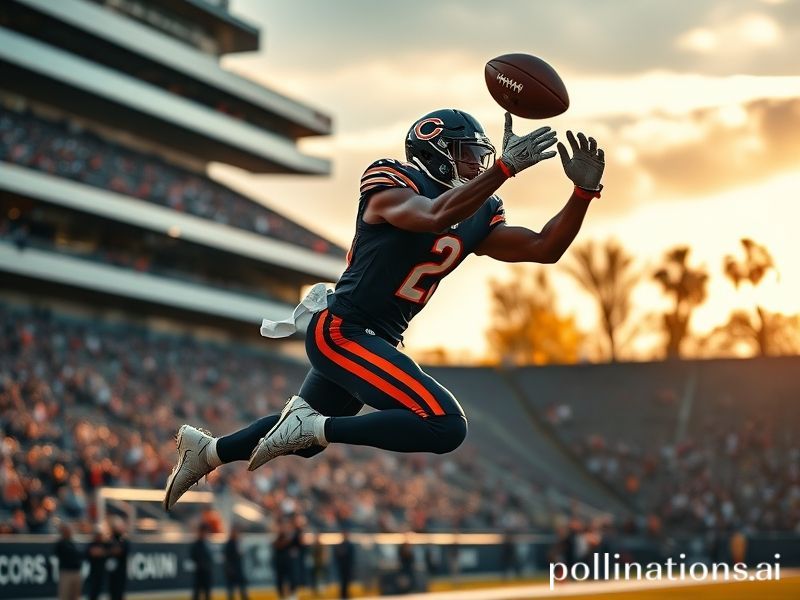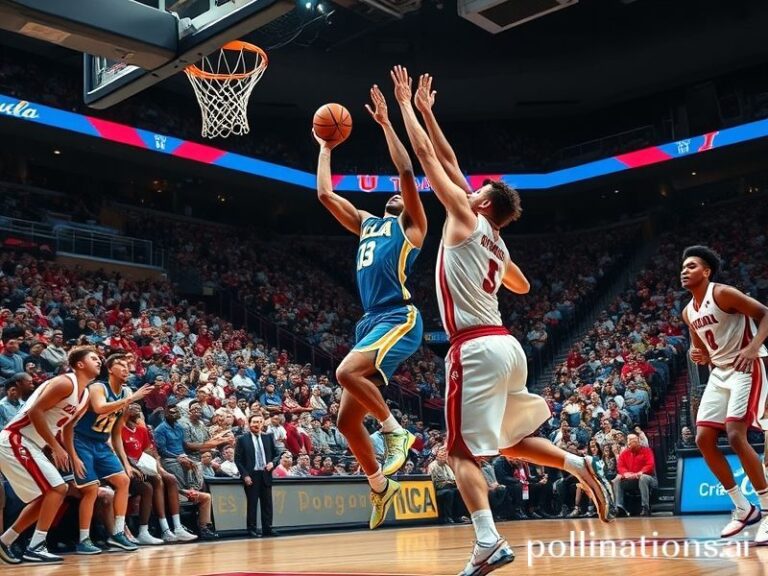D.J. Moore: The 190-Pound Canary in Globalization’s Coal Mine
The Curious Case of D.J. Moore: How a 190-Pound American Gladiator Quietly Became the Canary in Globalization’s Coal Mine
By Matteo “Macabre” Moretti, International Correspondent, Dave’s Locker
From the air-conditioned war rooms of NFL analytics departments to the sweat-soaked living rooms of Lagos, Nigeria—where Monday-morning quarterbacks stream games off sketchy websites—D.J. Moore has become an unlikely unit of geopolitical measurement. Not in the sense that trade treaties are denominated in “Moores,” although at this point nothing would surprise me. Rather, the Carolina-to-Chicago wideout embodies the 21st-century paradox: we ship microchips, crude oil, and increasingly fragile hope across oceans, yet the most reliable export might still be a kid from Philadelphia who can high-point a football better than most nations can balance a budget.
Let us zoom out like an over-enthusiastic satellite. The NFL is America’s last genuinely successful cultural imperial project—bigger than Starbucks, stealthier than Marvel, and only slightly less lethal than drone diplomacy. Every autumn, 32 franchises act as floating embassies, projecting soft power in the shape of shoulder pads. Moore’s migration from the Panthers’ small-market purgatory to the Bears’ legacy-brand purgatory (Chicago: where hope goes to get deep-dish heartburn) is therefore more than a salary-cap footnote. It is a miniature, high-definition trade route: draft picks, cap space, and human capital swapped like cryptocurrency for viewers who still believe the line of scrimmage is the last honest border left.
Global implications? Consider the supply chain. Moore’s highlight reels—stitched together by underpaid editors in Bangalore, soundtracked by K-pop beats pirated in São Paulo—circulate on phones assembled in Shenzhen from Congolese cobalt. Somewhere in this daisy chain of late-capitalist absurdity, a kid in rural Uttar Pradesh decides his future lies not in cricket but in running 4.3-second forties. The world shrinks, the hash marks stay 53⅓ yards apart, and we pretend this is progress.
Europe, meanwhile, watches with the detached amusement of an older sibling who’s already discovered soccer riots. The continent’s rugby nations—where cauliflower ear is a badge of honor—regard Moore’s acrobatics as evidence that Americans require helmets to perform basic motor functions. Still, L’Équipe ran a 1,200-word profile last month titled “Le Superman de la NFL,” illustrating the piece with a photo of Moore mid-jump, framed against a dystopian Chicago skyline that looks suspiciously like the banlieues of Paris. The French, ever poetic, called him “un ange noir dans un monde de concussions.” Translation: we admire your grace, pity your brain cells, and will happily monetize both.
Back in the States, Moore’s quiet dignity—he once celebrated a touchdown by handing the ball to a referee with the enthusiasm of a barista returning incorrect change—plays as a subtle rebuke to the league’s preferred narrative of choreographed egos. Meanwhile, the Bears’ front office markets him as the antidote to a decade of quarterback malpractice, which is a bit like prescribing aspirin for a guillotine wound. Still, jerseys bearing his name now ship to U.S. military bases in Okinawa, Ramstein, and Djibouti, where service members project their own homesick hopes onto every contested catch. In that sense, Moore has become a morale patch with sleeves.
One last planetary spin: As climate change nudges sea levels higher, the NFL’s latest international games—Munich, Mexico City, eventually maybe Mumbai—carry the faint whiff of disaster tourism. Moore will likely line up in one of these exotic venues soon, sprinting past cornerbacks while carbon credits are quietly traded in executive suites overhead. The stadium lights will hum, the crowd will chant phonetically learned English, and somewhere a polar ice shelf will sigh in resignation.
Conclusion? D.J. Moore is not saving the world; he is merely diagnosing it. A 190-pound diagnostic tool wrapped in Nike swag, reminding us that the same forces shipping avocados, microplastics, and ideological despair across borders can also deliver a perfectly timed post route. Whether that counts as consolation or indictment depends largely on your cable package—and whether you still believe the end zone is anywhere in sight.







